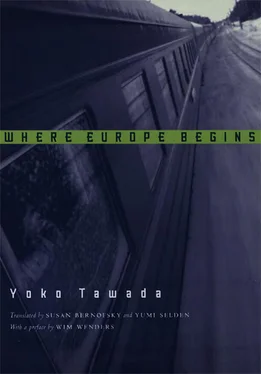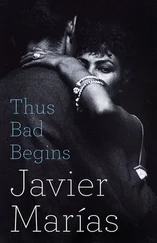After a while she raised her head and said, “Go home now, for tonight. Come again tomorrow night, won’t you? If you come tomorrow, I’ll give this back to you.” She showed me what she held in her hand. It was my tongue.
5
When I arrived home the light was on. I remembered that in the morning Xander had telephoned about coming tonight. Inside, the room was dense with smoke.
Xander sat on the sofa, smoking. “Does she know what time it is?”
I looked at the clock but its hands were missing. I washed my face with cold water to rinse off the makeup.
“So she’s working this late these days.”
I faced the mirror and opened my mouth wide. There was no tongue, only a dark cave continuing far back. Xander wasn’t really a photographer at all, he was my German teacher. Several years ago, when I had just arrived in this city and didn’t know the language, it was Xander who first taught me how to speak. Xander is a teacher at a private language school, and gives individual tutorials to beginners. The school’s pedagogical method consists of giving no explanations in other languages. The student repeats everything the teacher says until she’s memorized it. I still remember the first time I met Xander. He wore a pair of blue jeans with creases ironed into them and a shirt as white as paper, and in this respect looked no different from a high school student; but the neck, chin and cheeks that grew up out of his collar were covered with the skin of a world-weary middle-aged man.
“This is a book.” This was the first thing Xander ever said to me. I repeated the sentence without knowing where one word ended and the next began. “This is a book.”
By the time we had moved on to ballpoint pen and ashtray, I was already in love with Xander. At least that was how I felt. I can fall in love on the spot with someone who teaches me words. As I repeated Xander’s words, I felt that my tongue was starting to belong to him. When Xander drew on his cigarette, I began to cough and my tongue burned. Xander gave names to things as if he were the Creator. From this day on, a book became Buch to me, and a window Fenster .
The second class, however, did not go so easily. My happiness, which consisted of repeating everything I heard, was destroyed all too soon.
When asked, “Are you Japanese?” I would answer, “Yes, you are Japanese.” The trick in this game was to change “you” into “I,” but I didn’t yet realize it.
Xander laughed like a bursting balloon. I didn’t laugh. I repeated all of Xander’s words, but not his laugh.
That day we went into town to buy dolls. Xander bought me a Japanese doll made of silk, and I bought him a blond violinist marionette. Since then when we had a conversation we used ventriloquism to make the dolls talk. The dolls talked about us in the third person.
“Will Xander be able to meet his sweetheart tomorrow?” the violinist would ask, and the silk doll would answer, “Probably not. She does not wish to meet.” It went along like that. Soon I came to understand the first and second person, but Xander and I always stayed on third person terms.
•
“Where has she been? He was worried,” the violinist said, and hugged the silk doll. Xander had become skillful as a puppeteer, and could do this kind of thing with one hand without looking. In his other hand he held a cigarette.
“He was worried. He was afraid there might have been an accident.” With nimble fingers, the violinist peeled off the silk doll’s clothes. The silk, which was the color of cherry blossoms, flew up into the air and fell to the floor in layers, whereupon it became red as blood. When the last layer was gone, only the doll’s head remained, since her body consisted only of her clothes.
Next the violinist removed his tuxedo jacket, his white shirt, and his pants. He had no sex organ, just two spindly legs. This is often the case with children’s toys.
“I can sew one out of scraps of cloth. Isn’t it strange for there not to be one? Or maybe it would be better to carve one out of wood,” I said once. But Xander was annoyed and refused. He couldn’t stand to hear such things spoken of lightly.
“Even without things like that, there are differences between men and women. Men are moved from above by strings, whereas women are moved directly from behind. Men are made of wood, and women are made of silk. Men can close their eyes, and women can’t. These differences suffice to produce love.” Since Xander was of such an opinion, the violinist’s body remained untouched.
“She hasn’t turned mute now, has she?” the violinist asked, worried. “She hasn’t forgotten the language he taught her?” He was trembling and his joints clicked like castanets. For a long time now we’d been living like this, forgetting the obvious fact that dolls can’t talk.
The violinist said, “They should go to sleep now. Probably tomorrow everything will look different.” Xander ducked under the covers of the bed. At that moment the darkness was rent in two by the ringing of the telephone. It must be that woman. Xander sat up and reached for the receiver. I grabbed his arm and stopped him. Xander lay down again.
“Perhaps she has a new lover,” the violinist murmured. The phone rang seven times and then stopped. I remembered that my mother always put down the receiver after seven rings. My mother might be ill. It was eleven o’clock in Japan. I wondered if I should call her. But without a tongue?
When I heard Xander begin to snore, I put a finger in my mouth. My tongue really was gone.
6
The next day was Sunday. I heard dishes clinking in the next room and opened my eyes. Apparently Xander was making coffee.
I looked in the mirror and found reflected there a healthy woman who looked just like the one in the photograph. Her cheeks glowed like peaches and her lips curved into a smile although I didn’t particularly feel like smiling. I used makeup to create dark circles under my eyes. Then I filled in the contours of my lips with white lipstick, which made them look bloodless. Finally I rubbed the edges of my eyes with a little vinegar so that the skin shrank and puckered. Then I tore up the photograph and went into the kitchen where Xander was standing with his back to me, looking out the window.
Xander’s name rang inside my skull but remained unspoken. I took milk out of the refrigerator and began to warm it. Xander turned around and put his hands on my shoulders, but when he saw the milk he quickly left the room. He couldn’t stand the smell of warm milk.
The violinist and the silk doll were already sitting in their places at the doll’s table, dressed in their Sunday best.
“Did something happen to her yesterday?” the violinist asked. He waited a long time for an answer, but finally gave up and said with a sigh, “It looks like she’s stopped speaking the language he taught her.”
I sliced bread. Xander didn’t eat anything. The bread had just been baked, so it was moist and not very good. I wanted old, dry bread, as hard as coal.
“Will she take him where she went last night?”
I nodded. We walked along the empty Sunday morning streets toward the hotel. From the hotel, I remembered the way very well: out the back door, across the street at the light, then down the first narrow alley on the right. The pavement and the façade of the old gray building were bathed in morning light and had nothing mysterious about them at all. From a distance I could already see the basement window.
There was no glass in the window frames, and the iron bars were covered with spider webs. I squatted down to look into the dim interior. Nothing but a few burnt black objects scattered about, and on the floor the outline of a person in chalk. The wall, too, was black and burnt.
Читать дальше












